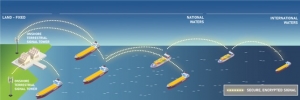


(Posted on 25/05/22)
Inmarsat, the world leader in global, mobile satellite communications, has completed the first phases of testing of innovative technology developments for ORCHESTRA, the company’s forthcoming dynamic network of the future.
The tests proved the ability to deliver additional capacity at hotspots via unique, shore-based terrestrial networks. Continued growth in demand in key ports and shipping lanes as well as airports and busy flightpaths will lead to signal congestion in the future, potentially affecting vital connectivity. Inmarsat is developing the terrestrial part of ORCHESTRA to provide targeted capacity to tackle these hotspots locally to stay ahead of demand and continue to deliver the industry’s highest performance.
The tests took place in Singapore between land-based signal towers and ships offshore using Inmarsat proprietary technologies across various combinations of frequency bands and terminal equipment onboard vessels. These real-world cases established achievable performance for ship-to-shore and ship-to-ship connectivity, including distances, range, throughput and link availability.
Singapore was chosen because it is one of the world's busiest container ports, as well as being one of the most demanding environments because of equatorial weather conditions such as heavy rain and high humidity. The tests proved the effectiveness of the stepping-stone connections in the ORCHESTRA maritime mesh, which are expected to reach at least 10 kilometres (6.2 miles) and 100 megabits per second per link, with the mesh network extending this to 30km (18.6 miles) and beyond, enabling, for example, the download of a HD movie in 40 seconds. Just five shore stations near Singapore would deliver in excess of 10 gigabits per second across this important location.
Peter Hadinger, Chief Technology Officer at Inmarsat, said “The demand for connectivity is growing constantly and Inmarsat continues to anticipate the needs of our customers, meeting future demand from them through the multi-network power of ORCHESTRA. Today’s news is real world proof of how Inmarsat ORCHESTRA will tackle emerging hotspots in busy maritime areas such as congested ports and shipping lanes via terrestrial connectivity to supplement our global satellite networks.
“Through Inmarsat’s innovative use of spectrum and technology, combined with state of the art terrestrial mesh networks including using vessels as stepping-stones, Inmarsat will deliver enhanced and customised connectivity to our customers. This will enable Inmarsat to improve services in the future by anticipating and managing demand from customers in hotspots. It is a win for all our users and Inmarsat will work with national regulators to deliver the benefits of advanced regional connectivity that will also contribute to their governments’ economic growth plans.
“Inmarsat already leads the world in global, mobile satellite communications via ELERA in L-band and Global Xpress in Ka-band. ORCHESTRA will combine high density terrestrial connectivity and a low cost, limited number of low Earth orbit satellites with these existing, leading geostationary networks, which we will supplement further through six additional launches by 2025.”
ORCHESTRA combines geostationary orbit (GEO) satellites, low Earth orbit (LEO) satellites and terrestrial communications into a dynamic mesh network to redefine connectivity at scale. It will deliver the highest capacity for mobility worldwide as well as the fastest average speeds and the lowest average latency of any network, planned or in existence.
Leading vessel performance platform Smart Ship Hub says the industry should expect a breakthrough year... Read more
The Nordic countries are taking an important step towards decarbonising maritime transport with the... Read more
Germany’s Steelpaint has appointed ADD Marine as its representative for Greece and Cyprus, strengthening... Read more
Rio Tinto’s first Pilbara-made iron ore rail car has rolled off the production line in Karratha... Read more
Precision meets progress at Phu My Port, Vietnam. The LPS 550 has been deployed to handle bulk commodities... Read more
bound4blue, a global leader in wind propulsion systems, has expanded its industrial footprint in Asia... Read more
As the industry explores multiple decarbonisation pathways, methanol is gaining attention as a practical... Read more
Technology group Wärtsilä will supply an integrated hybrid propulsion system for a bulk carrier... Read more
Superior Industries, Inc., a US-based manufacturer and global supplier of bulk material processing and... Read more
ESL Shipping has taken a significant step forward in digitalisation by deploying a new multichannel... Read more